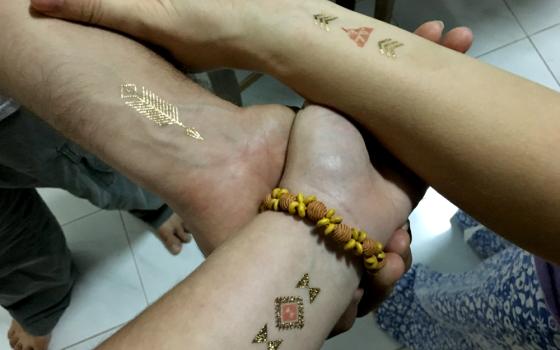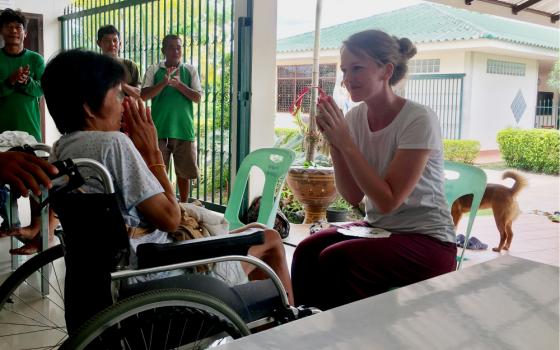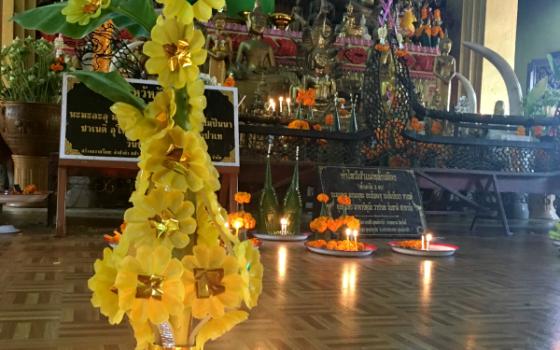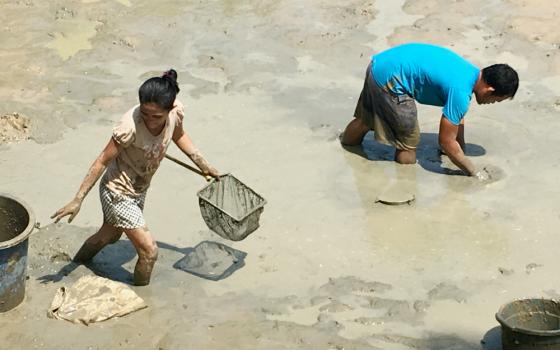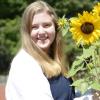Notes from the Field includes reports from young people volunteering in ministries of Catholic sisters. A partnership with Catholic Volunteer Network, the project began in the summer of 2015. This is our fifth round of bloggers: Katie Delaney is a Good Shepherd Volunteer with the Fundación Madre Josefa (Mother Joseph Foundation) in Santiago, Chile, and Lauren Magee is a Good Shepherd Volunteer at Hands of Hope, an income-generating project that provides dignified employment for villagers living with HIV/AIDS in Nong Khai, Thailand.
______
Good Shepherd Volunteers live under the four tenets of social justice, spirituality, simplicity and community. Many aspects of the program challenge and encourage growth within the tenets, but it is the responsibility of individuals to pursue opportunities provided and reflect upon these values in their daily lives.
A variety of social justice issues are intertwined in all of our service sites. Simplicity is promoted in our modest stipend; and weekly reflections, quotes and prayers foster spiritual awareness. Traditionally, the tenet of community is defined by living alongside fellow Good Shepherd Volunteers, sharing in your experience and committing yourselves to one another.
This held true my first year with the Good Shepherd Volunteers, but since beginning my second year in Thailand, my community has been outside the norm.
I try to live without too many expectations because life is unpredictable, but I've learned that sometimes expectations are subconscious, and you don't realize you have them until they are unfulfilled.
I accepted my position at Hands of Hope with the knowledge that I would be joining a married couple, John and Susan Freund, who had been serving in Nong Khai for a year. The arrangement was for them to overlap with me and another Good Shepherd Volunteer for six months, and the two of us would complete our year as a pair.
However, we were unable to secure a fourth volunteer, and suddenly my future community in the program became uncertain. I had already met the Freunds at my first orientation, and the unique dynamics this new community would require did not intimidate me. I was confident we could thrive as a trio, and we did!
But as I looked ahead to their departure, I felt insecure. Since I moved to Thailand in August, I only knew how to live there with them by my side.
I was open to the idea of continuing alone, but eight months seemed extensive. As my conversations with staff continued, fate intervened and brought a Danish volunteer named Lotte into consideration. She had a job commitment starting in the spring, so her time at the care center was limited to three months. Her background in nursing was an asset, and her presence undoubtedly helped ease the transition of John and Susan's departure. She arrived Feb. 1, only a day after John and Susan left.
A week has passed since Lotte left the community. I have never lived alone and, as a woman obsessed with intentional communities, I never planned to. Community has given me confidence and understanding in who I am in relation to others. But now is the time to learn who I am with just myself.
When the opportunity arose, I couldn't seem to turn down the challenge. I have just finished my first week alone, and I'm not naive enough to think these next five months will be as smooth, but I'm hopeful.
I'm sure I'll miss many things: speaking English at home, sharing the responsibilities of cooking and cleaning, gathering every night around the dinner table, sharing with a fellow volunteer the struggle of understanding Thai cultural norms, and simply learning about someone else's day and sharing my own. I continuously miss John, Susan and Lotte, not only because of what they did, but because of who they are.
But sometimes we need deficits to open ourselves up for growth.
The truth is, it's impossible for me to truly be alone. I live among a large group of patients, families and staff who are always caring for me. They've witnessed countless volunteers adjust to different living situations, but it makes them uneasy to think I won't have a partner with a similar cultural background to confide in as I finish my service here.
I understand that culture has a huge influence on behavior and self-identity, but more and more, I find similarities between my personality and that of the patients, Hands of Hope producers and Thai staff. These similarities overshadow many of our differences.
Humor is my favorite tool in building connections, and physical comedy appears to be universal. I can laugh alongside the patients when someone goofs around during daily exercises or when someone tries a facial mask for the first time, appearing with black goo all over their face.
We can all dance together in harmony, enjoying both Thai and Western songs while combining traditional Thai hand movements with the style of American hip-hop. I exchange recipes with those who enjoy cooking and bring my food experiments over for everyone to try.
The community also maintains a responsibility for the well-being of one another and a protection from hardship that can be prevented. We may not share the same religion, but we pray together every day with gratitude for the gifts we have and the health and happiness of one another.
More than anything else, there is a common thread of love wrapped around everyone who enters that is impossible to cut loose.
Additionally, I see pieces of myself in all of the patients and producers, and I see my friends and family reflected in their faces. I often compare their personalities and unique traits to others in my life, and it makes me feel closer to them, as though my loved ones are here with me. I see the same sassiness and passion for life in our teenagers as I did in the teens I worked with in New York City, and the Hands of Hope producers nurture me just as my mother would do. I see my own stubbornness and immaturity in a few of the patients, as well as my creativity and compassion for others. My own fears are reflected back at me, but my strength is, as well.
Expecting four, moving to three, starting anew as two, then living alone has been a whirlwind of transitions, but at this point in my experience, I don't need another foreigner by my side to relate to. Versions of myself and of those I hold dear surround me. I find peace in this familiarity.
[Lauren Magee is a Good Shepherd Volunteer at Hands of Hope, an income-generating project that provides dignified employment for villagers living with HIV/AIDS in Nong Khai, Thailand.]
